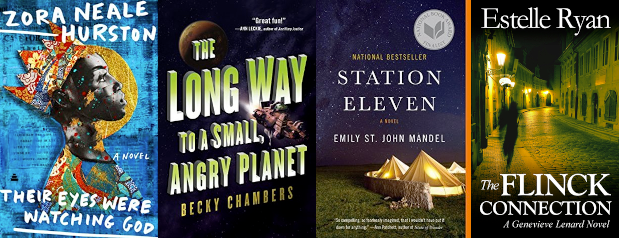What I Read For Women's History Month 2021

I don’t read enough books written by women. Since I started keeping track of what I read, only 33% of the 180 different authors I’ve read are women. That’s a problem. I’ll be making a more concerted effort to read books by women from now on, starting with Women’s History Month, where I read books exclusively by women. Here’s what I read along with some of my favorite passages from each book.
- Their Eyes Were Watching God by Zora Neale Hurston
- The Long Way to a Small, Angry Planet by Becky Chambers
- Station Eleven by Emily St. John Mandel
- The Flinck Connection by Estelle Ryan
Their Eyes Were Watching God by Zora Neale Hurston
There are years that ask questions and years that answer.
She knew now that marriage did not make love. Janie’s first dream was dead, so she became a woman.
Once having set up her idols and built altars to them it was inevitable that she would worship there. It was inevitable that she should accept any inconsistency and cruelty from her deity as all good worshippers do from theirs. All gods who receive homage are cruel. All gods dispense suffering without reason. Otherwise they would not be worshipped. Through indiscriminate suffering men know fear and fear is the most divine emotion. It is the stones for altars and the beginning of wisdom. Half gods are worshipped in wine and flowers. Real gods require blood.
"Then you must tell ’em dat love ain’t somethin’ lak uh grindstone dat’s de same thing everywhere and do de same thing tuh everything it touch. Love is lak de sea. It’s uh movin’ thing, but still and all, it takes its shape from de shore it meets, and it’s different with every shore."
The Long Way to a Small, Angry Planet by Becky Chambers
The price of a fresh start was having no one to fall back on.
“No good can come from a species at war with itself. Never has, never will.”
In many ways, the idea of a shared stock of genes drifting through the galaxy is far easier to accept than the daunting notion that none of us may ever have the intellectual capacity to understand how life truly works.
To some Humans, the promise of a patch of land was worth any effort. It was an oddly predictable sort of behavior. Humans had a long, storied history of forcing their way into places where they didn’t belong.
“Ninety percent of all problems are caused by people being assholes.”
Station Eleven by Emily St. John Mandel
No more Internet. No more social media, no more scrolling through litanies of dreams and nervous hopes and photographs of lunches, cries for help and expressions of contentment and relationship-status updates with heart icons whole or broken, plans to meet up later, pleas, complaints, desires, pictures of babies dressed as bears or peppers for Halloween. No more reading and commenting on the lives of others, and in so doing, feeling slightly less alone in the room. No more avatars.
All three caravans of the Traveling Symphony are labeled as such, THE TRAVELING SYMPHONY lettered in white on both sides, but the lead caravan carries an additional line of text: Because survival is insufficient.
Hell is the absence of the people you long for.
He found he was a man who repented almost everything, regrets crowding in around him like moths to a light. This was actually the main difference between twenty-one and fifty-one, he decided, the sheer volume of regret.
The Flinck Connection by Estelle Ryan
These people were so strongly opposed to being clear and honest with their emotions. I considered life much less complicated with honesty.
The hardest part of friendship had been the constant sense of vulnerability.
“There is no such thing as normal. Neurotypical, yes. Normal is a term that is subjective to each subculture and even smaller communities within.”